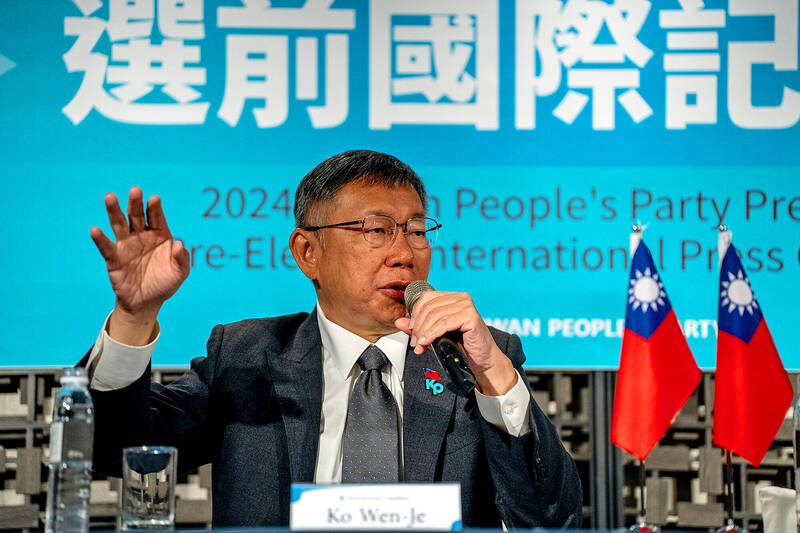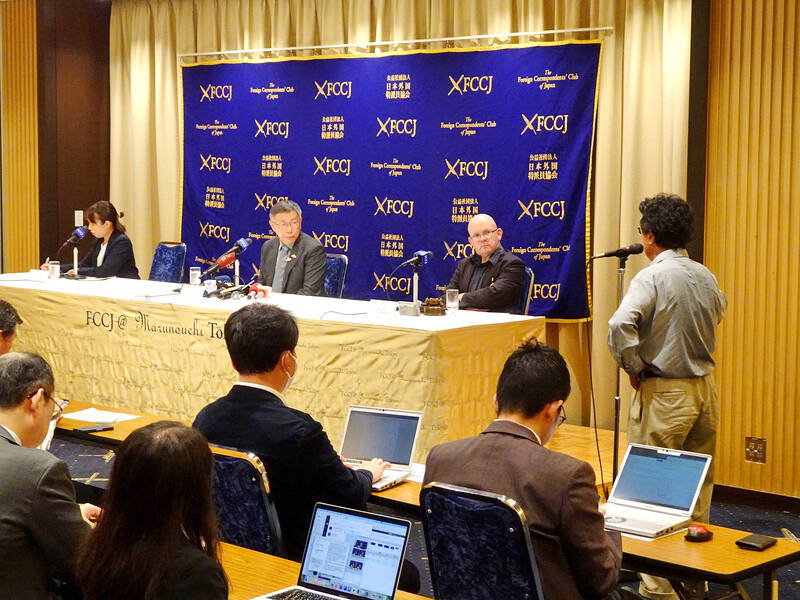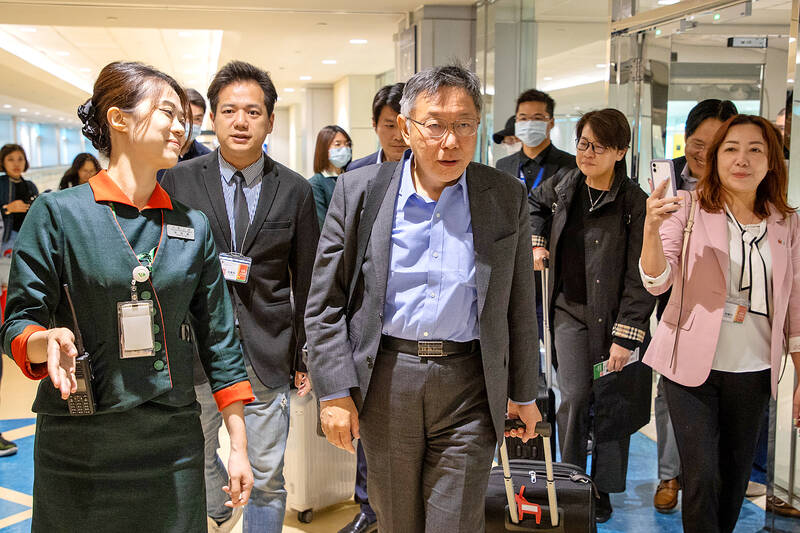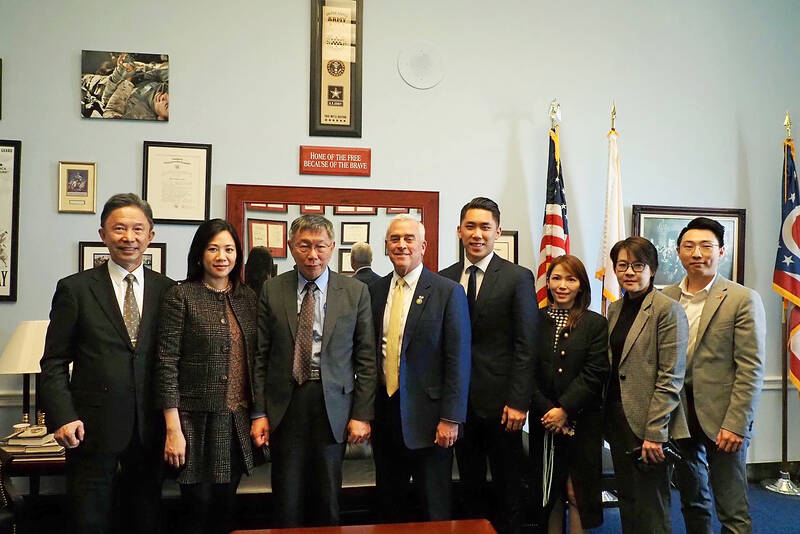My friends and I have been enjoying the last two weeks of revelation after revelation of the financial and legal shenanigans of Taiwan People’s Party (TPP) head and recent presidential candidate Ko Wen-je (柯文哲).
Every day brings fresh news — allegations that a building had purchased with party subsidies but listed in Ko’s name, allegations of downloading party subsidy funds into his personal accounts. Ko’s call last December for the regulations for the government’s special budgets to be amended to enforce fiscal discipline, and his September unveiling of his party’s anti-corruption plan, have now taken on a certain delightful irony.
On X, longtime Taiwan scholar and observer Mark Harrison tweeted: “Ko and the TPP in trouble. If only someone could have predicted this ... oh wait, all of #taiwantwitter did.”

Photo: Bloomburg
That’s pretty much correct.
All of Taiwan Twitter knew what Ko was, and how this would likely end. We’d lived through the low approval ratings of his mayorship in Taipei, and the major scandals during that time. So had the voters.
FOREIGN MEDIA TRACTION

Photo: CNA
The only place where Ko had traction was among young male voters, and of course, the media, especially the international media. The story was obvious: Ko and the young, and the international media ran with it. One is moved to wonder how much Ko benefited from all that free advertising, all that concealment of his true positions, all that disappearance of his past.
“A non-traditional candidate resonates with Taiwan’s youth ahead of Saturday’s presidential election,” scribed AP news. South China Morning Post said: “Ko Wen-je’s unconventional style and focus on domestic issues is winning support among young voters who are turning away from the main parties.” The Straits Times titled a piece: “Ko Wen-je, the improbable politician popular with young Taiwanese voters.”
He was often described as some variation on “a straight-talking politician.” This rhetorical position linking “non-traditional” or “maverick” with youth was common across the international media, whose verbiage is reflected in Taiwan’s own reporting.

Photo: CNA
In vain did local commentators writing in English point out that Ko was no maverick but was in fact an unimaginative cranky uncle-type authoritarian social conservative who had said aloud that people with non-standard sexualities had a mental illness, who had said of social housing that poor people did not deserve a three-bedroom house, whose economic and social ideas were decades out of date, whose inspirations were dictators like Mao Zedong (毛澤東) and former Taiwan president Chiang Ching-kuo (蔣經國) and Singapore (he has likened the TPP to the People’s Action Party).
Little to none of that made its way into the foreign media. One has to wonder how someone who thought Singapore a model would have treated the international media, had he gained real power.
CONTEXTUALIZING KO

Photo courtesy of Taiwan People’s Party
The Guardian at least had a grazing shot at the issue in its election-eve report: “Depending on who is asked, Ko is a flexible pragmatist or a superficial populist who lacks core values.”
Some pieces similarly noted that he was not popular with older voters. Indeed, the thing about Ko highlighted in international media reports was always his alleged popularity with the young, never his unpopularity with older, wiser voters.
The reach for false balance (“depends on who you ask”) is a safe move, but ultimately, Taiwan would have been better served if any of the reports had evinced the depth and knowledge of longtime Taiwan watcher James Baron’s excellent piece at Unherd: “Is Ko Wen-je China’s man in Taiwan? The presidential candidate is the ultimate shapeshifter.” The title forthrightly locates Ko’s true politics and position in the political landscape, which Baron then backs up by quoting well-known Taiwan politics observers Lev Nachman and Nathan Batto.
The possibility that Ko was China’s preferred candidate came out quite early — he had to respond to that allegation in May of last year, for example. It was more or less AWOL from international press reports, except for a January Nikkei piece.
Another problematic stance Baron avoids is treating Ko as if he were sui generis. Instead, Baron backgrounds him against Taiwan history. That was one possibility — there were many ways Ko could have been contextualized. Ko could also have been backgrounded against his own historical dreams, preconceptions, ideals and political mimicry, as an excellent February piece in the Melbourne Asia Review did.
I did so in last month, discussing him in light of his emulation of Chiang Ching-kuo. Ironically, the only international media piece I could find that linked a presidential candidate to Chiang was a Reuters piece about the DPP’s William Lai.
CREATED BY THE MEDIA
Ko was sometimes compared to Trump, who similarly cried that his nation would be lost if he were not elected, but the international media failed to place Ko in a much broader comparison with other populist and would-be populist leaders around the globe.
That would have been helpful in understanding what he was, an understanding that could have been reflected back to Taiwan. It would also have helped contextualize why older voters were turned off by Ko: we’ve all seen multiple examples of politicians like Ko in our lifetimes. The comparison to Trump is apt: Trump, like Ko, was and is in part a creation of the media. If only it had learned from the Trump experience.
Consider just one item widely cited by local observers and media, Ko’s constant reference to his own superior intelligence and his abuse of people without college educations. This is often instanced by his local critics. For example, the extraordinary writers Albert Wu (吳孟軒) and Michelle Kuo (郭怡慧) of A Broad and Ample Road, explaining why progressives hate Ko, point to his “unabashed, unapologetic, self-aggrandizing elitism. Ko often refers to his IQ score of 157, name-drops NTU ...”
This is a quintessential behavior of Ko’s. Good luck finding it widely reported in the international media.
Fast forward to last month, with its deluge of scandals involving Ko and his party for nearly three weeks now. The reader can be forgiven for expecting a reciprocal deluge of international media reports on the “maverick” and “outsider” and his scandals, especially since Taiwan is now well-stocked with talented international reporters, but as I write this, the only piece in a major international media I can find is from the always solid Nikkei, dated Aug. 16.
I guess when the only thing truly “maverick” about Ko is his unexcelled naivete about stocking his party with ex-Chinese Nationalist Party (KMT) people, the international media loses interest.
As of this writing, Ko has announced that he will be stepping down as party chair for three months.
Notes from Central Taiwan is a column written by long-term resident Michael Turton, who provides incisive commentary informed by three decades of living in and writing about his adoptive country. The views expressed here are his own.

Oct. 27 to Nov. 2 Over a breakfast of soymilk and fried dough costing less than NT$400, seven officials and engineers agreed on a NT$400 million plan — unaware that it would mark the beginning of Taiwan’s semiconductor empire. It was a cold February morning in 1974. Gathered at the unassuming shop were Economics minister Sun Yun-hsuan (孫運璿), director-general of Transportation and Communications Kao Yu-shu (高玉樹), Industrial Technology Research Institute (ITRI) president Wang Chao-chen (王兆振), Telecommunications Laboratories director Kang Pao-huang (康寶煌), Executive Yuan secretary-general Fei Hua (費驊), director-general of Telecommunications Fang Hsien-chi (方賢齊) and Radio Corporation of America (RCA) Laboratories director Pan
The consensus on the Chinese Nationalist Party (KMT) chair race is that Cheng Li-wun (鄭麗文) ran a populist, ideological back-to-basics campaign and soundly defeated former Taipei mayor Hau Lung-bin (郝龍斌), the candidate backed by the big institutional players. Cheng tapped into a wave of popular enthusiasm within the KMT, while the institutional players’ get-out-the-vote abilities fell flat, suggesting their power has weakened significantly. Yet, a closer look at the race paints a more complicated picture, raising questions about some analysts’ conclusions, including my own. TURNOUT Here is a surprising statistic: Turnout was 130,678, or 39.46 percent of the 331,145 eligible party

The classic warmth of a good old-fashioned izakaya beckons you in, all cozy nooks and dark wood finishes, as tables order a third round and waiters sling tapas-sized bites and assorted — sometimes unidentifiable — skewered meats. But there’s a romantic hush about this Ximending (西門町) hotspot, with cocktails savored, plating elegant and never rushed and daters and diners lit by candlelight and chandelier. Each chair is mismatched and the assorted tables appear to be the fanciest picks from a nearby flea market. A naked sewing mannequin stands in a dimly lit corner, adorned with antique mirrors and draped foliage

The election of Cheng Li-wun (鄭麗文) as chair of the Chinese Nationalist Party (KMT) marked a triumphant return of pride in the “Chinese” in the party name. Cheng wants Taiwanese to be proud to call themselves Chinese again. The unambiguous winner was a return to the KMT ideology that formed in the early 2000s under then chairman Lien Chan (連戰) and president Ma Ying-jeou (馬英九) put into practice as far as he could, until ultimately thwarted by hundreds of thousands of protestors thronging the streets in what became known as the Sunflower movement in 2014. Cheng is an unambiguous Chinese ethnonationalist,